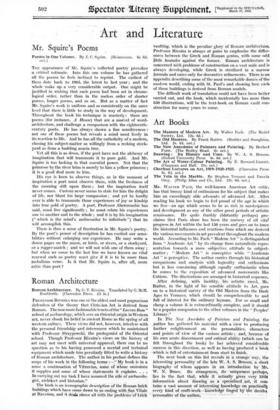Art and Literature
Mr. Squire's Poems
TOE appearance of Mr. Squire's collected poetry provokes a critical estimate. Into this one volume he has gathered all the poems he feels inclined to reprint. The earliest of them date back to 1905, the latest to last year ; and the whole make up a very considerable output. One might be justified in wishing that each poem had been set in chrono- logical order, rather than in the useless order of shorter poems, longer poems, and so on. But as a matter of fact Mr. Squire's work is uniform and so consistently on the same level that there is little to study in the way of development. Throughout the book his technique is masterly: there are poems (for instance, A House) that are a marvel of word- architecture, and challenge a comparison with the eighteenth- century poets. He has always shown a fine sensitiveness : not one of these poems but reveals a mind most lively in its reaction to life. And he has all the catholicity of a modern, chosing his subject-matter as willingly from a reeking stock- yard as from a budding acacia tree.
Yet all this is as dross, if the poet have not the alchemy of imagination that will transmute it to pure gold. And Mr. Squire is too lacking in that essential power. Not that the primrose by the river brim is merely to him a yellow primrose ; it is a good deal more to him.
His eye is keen to observe things, as in the moment of inspiration a poet must obserVe them, with the freshness of the morning still upon them ; . but the inspiration itself never comes. Custom never seems to stale for him the delight of life, nor blunt his large compassion ; and yet he hardly ever is able to transmute those experiences of joy or kinship into true gold of poetry. A poet, Professor Abercrombie has said, must live significantly-; he must-relate his experiences one to another and to the whole ; and it is by his imagination (" which is the mind's ambassador to infinitude") that be will accomplish this.
There is thus a sense of frustration in Mr. Squire's poetry. By the poet's power of description he has excited our sensi- bilities without enlarging our experience. He may write a dozen pages on the moon, or birds, or rivers, or a stockyard, or a rugger-match ; and we will not wish one of them away ; but when we come to the last line we have known no vital renewal such as poetry must give if it is to be more than melodious verse. Is it that Mr. Squire is, after all, more critic than poet ?






















































 Previous page
Previous page